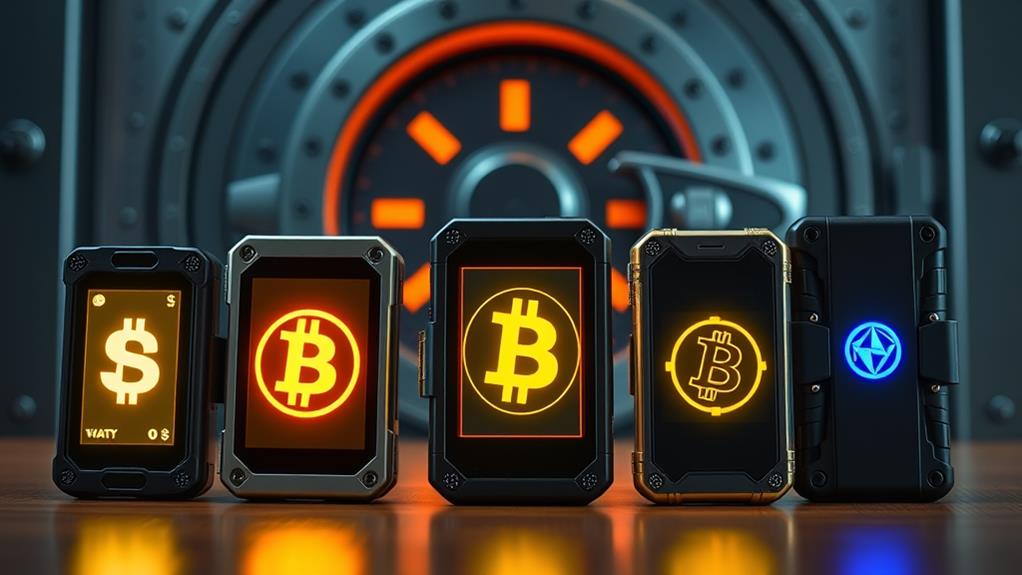
We’ve thoroughly tested and reviewed the top 5 crypto wallets to help you protect your digital assets. Our list includes the Ledger Nano X, Trezor Model T, SecuX V20, and D’CENT Biometric Wallet. We’ve evaluated each wallet based on supported cryptocurrencies, user interface, and backup and recovery options. We’ve also compared hardware vs. software wallets to give you an exhaustive rundown. Whether you’re a beginner or an experienced crypto investor, our review covers the essential features you need to weigh when choosing a wallet. Plunge into our detailed analysis to find the perfect wallet for your needs.
Table of Contents
Top 5 Crypto Wallets Reviewed

We’ve carefully evaluated the top crypto wallets on the market to bring you our top five recommendations. Our list includes the Ledger Nano X, Trezor Model T, SecuX V20, D’CENT Biometric Wallet, and Ledger Nano S Plus. We’ll examine each of these wallets’ unique features, security measures, and user experiences to help you make an informed decision.
Ledger Nano X
For crypto enthusiasts seeking a secure and versatile hardware wallet, the Ledger Nano X stands out as a top contender. Priced at $149, it offers cutting-edge security features, including a certified chip and proprietary operating system. We’re impressed by its ability to manage up to 100 crypto assets simultaneously, supporting over 5,500 coins and tokens through the Ledger Live app.
The Nano X’s Bluetooth capability enables on-the-go management, while its secure Eink touchscreen provides an extra layer of protection. With a 4.4-star rating from over 8,000 customers, it’s clear that users appreciate its ease of use and robust security. However, some have reported issues with the physical design and battery functionality. Despite these minor drawbacks, the Ledger Nano X’s competitive pricing, extensive support, and industry-leading security make it a compelling choice for those looking to safeguard their digital assets.
Best For: Cryptocurrency investors and enthusiasts seeking a secure, versatile hardware wallet with advanced features and broad coin support.
Pros:
- Supports over 5,500 coins and tokens with capacity for 100 simultaneous applications
- Advanced security features including certified chip and proprietary operating system
- Bluetooth capability for on-the-go management and real-time portfolio tracking
Cons:
- Some users report issues with physical design and battery functionality
- Higher price point compared to some competitors at $149
- Limited memory storage capacity of 1 GB may be insufficient for some users
Trezor Model T
Cryptocurrency enthusiasts seeking top-tier security and user-friendly functionality will find the Trezor Model T an excellent choice. This compact device, weighing just 3.21 ounces, packs a punch with its 1.54″ LCD touchscreen and support for thousands of coins and tokens.
We’re impressed by the Model T’s innovative security features. It’s the first hardware wallet with a touchscreen for secure PIN and passphrase entry, thwarting potential keyloggers. The randomized PIN pad adds another layer of protection against fingerprinting attacks. As pioneers in the hardware wallet industry since 2014, SatoshiLabs has maintained an open-source design, allowing users to verify the code themselves.
The Model T’s user-friendly interface, multiple passphrase wallet support, and compatibility with Android devices make it a versatile choice. With a 4.6-star rating from over 2,400 reviews, it’s clear that users appreciate its blend of security and ease of use.
Best For: Cryptocurrency enthusiasts who prioritize top-tier security, user-friendly features, and support for a wide range of digital assets.
Pros:
- Advanced security features including touchscreen PIN entry and randomized PIN pad
- Open-source design allows for user verification and transparency
- Supports thousands of coins and tokens with an easy-to-use interface
Cons:
- Higher price point compared to some other hardware wallets
- Touchscreen may be less durable than traditional button interfaces
- Requires USB-C to USB-C cable for Android compatibility, which isn’t included
SecuX V20
Crypto enthusiasts seeking a secure and versatile hardware wallet will find the SecuX V20 an impressive option. We’re impressed by its military-grade security features and dynamic keypad, which guarantee elite protection for your digital assets. The V20’s intuitive touchscreen and on-device portfolio make managing your cryptocurrencies a breeze.
Supporting over 10,000 coins and tokens across 300+ blockchain networks, this wallet offers unparalleled flexibility. We appreciate the USB Type C connectivity and compatibility with both iOS and Android devices. At $116.95, it’s a solid investment for serious crypto users. Customer reviews are largely positive, with high marks for value, storage capacity, and build quality. However, some users have reported issues with purchasing crypto through the software, and customer support responsiveness could be improved. Overall, the SecuX V20 stands out as a robust and feature-rich hardware wallet option.
Best For: Serious cryptocurrency investors seeking a highly secure, feature-rich hardware wallet with extensive coin support and user-friendly interface.
Pros:
- Military-grade security features and dynamic keypad for enhanced protection
- Supports over 10,000 coins and tokens across 300+ blockchain networks
- Intuitive touchscreen and on-device portfolio for easy management
Cons:
- Some users report issues with purchasing crypto through the software
- Customer support responsiveness could be improved
- Relatively higher price point compared to some competitor models
D’CENT Biometric Wallet
Users seeking a balance between security and convenience will find the D’CENT Biometric Wallet an ideal choice. This innovative device combines cutting-edge biometric technology with user-friendly features, making it a standout option in the crypto wallet market.
We’re impressed by the D’CENT’s ease of use, which sets it apart from many competitors. The wallet’s intuitive interface allows even crypto novices to navigate its features effortlessly. What really caught our attention is its extensive support for a wide range of coins and tokens. This versatility guarantees that users can manage diverse crypto portfolios without the need for multiple wallets. The biometric security feature adds an extra layer of protection, giving users peace of mind while maintaining quick access to their assets. For those looking to stay ahead in the rapidly evolving world of cryptocurrencies, the D’CENT Biometric Wallet offers a compelling blend of security, convenience, and versatility.
Best For: Cryptocurrency enthusiasts seeking a secure and user-friendly hardware wallet with support for a wide range of coins and tokens.
Pros:
- Advanced biometric security features
- Intuitive interface suitable for beginners and experienced users
- Extensive support for various cryptocurrencies
Cons:
- May be more expensive than basic hardware wallets
- Biometric technology could potentially malfunction
- Reliance on battery power may require frequent charging
Ledger Nano S Plus
For those seeking a balance of security and versatility in their crypto storage, the Ledger Nano S Plus stands out as a top contender. We’re impressed by its compact design and ability to support over 5,500 cryptocurrencies and tokens. With a storage capacity of up to 100 apps, it’s a game-changer for managing diverse digital assets.
The large touchscreen display enhances user experience, allowing for easy navigation and transaction verification. We can’t overlook the robust security features, including a secure element chip and proprietary operating system. It’s compatible with various devices, ensuring we can access our crypto on-the-go. Whether you’re a beginner or an experienced user, the Ledger Nano S Plus offers the perfect blend of security and convenience. Its innovative approach to crypto management makes it a must-have for those looking to stay ahead in the digital asset world.
Best For: Cryptocurrency enthusiasts seeking a secure, versatile, and user-friendly hardware wallet for managing multiple digital assets on-the-go.
Pros:
- Supports over 5,500 cryptocurrencies and tokens
- Large touchscreen display for easy navigation and transaction verification
- Robust security features including secure element chip and proprietary operating system
Cons:
- Limited storage capacity compared to some other hardware wallets
- May require a learning curve for complete beginners in cryptocurrency
- Potential for loss or damage due to its small, portable size
Things To Consider When Buying a Crypto Wallet
When choosing a crypto wallet, we need to ponder several key factors. We’ll look at security features, supported cryptocurrencies, user interface, and the choice between hardware and software wallets. We’ll also examine the importance of backup and recovery options to guarantee our digital assets remain safe and accessible.
Security Features
Security features are paramount when selecting a crypto wallet. We’re looking for cutting-edge solutions that offer multi-layered protection for our digital assets. Biometric authentication, like fingerprint or facial recognition, adds an innovative layer of security, verifying only we can access our accounts. The output is the same as the wallet when it comes to encryption, which is vital for safeguarding our private keys and sensitive information.
We’re impressed by wallets that incorporate two-factor authentication (2FA), requiring us to provide two different authentication factors. This extra step substantially enhances security. Regular software updates and backups are essential, keeping our wallets protected against emerging threats. For maximum security, we’re drawn to cold storage options that keep our assets offline and out of reach from cyber attacks.
We’re also considering physical security features, such as tamper-proof designs and air-gapped systems, which isolate our wallets from the internet. Seedless cold storage methods eliminate the risk of seed phrase loss or theft, offering an innovative approach to cryptocurrency security. Finally, we’re factoring in battery life, as longer-lasting batteries reduce maintenance concerns and guarantee our wallets are always ready for use.
Supported Cryptocurrencies
Cryptocurrency enthusiasts know that a wallet’s supported assets can make or break its usefulness. When evaluating crypto wallets, we must consider the range of Crypto Asset Options available. Top-tier wallets support hundreds or even thousands of cryptocurrencies, enabling Diverse Portfolio Management in a single platform.
We’ve found that wallets like Coinbase Wallet offer impressive Multi Chain Support, accommodating over 500 assets. This Asset Storage Flexibility allows users to manage Bitcoin, Ethereum, Litecoin, and numerous lesser-known tokens efficiently. It’s vital to examine the Supported Token List, ensuring it aligns with your investment strategy and future plans.
The number of supported cryptocurrencies can impact fees and security features, so we recommend thorough research. Some wallets charge varying fees for different assets, while others may have stronger security measures for specific cryptocurrencies. We should also consider wallets that regularly update their supported assets, as this future-proofs our storage options.
User Interface
Beyond the range of supported cryptocurrencies, a wallet’s user interface can make or break the user experience. We’ve found that a user-friendly interface is vital for seamless crypto management, especially for those new to the space. When evaluating a wallet’s UI, we look for clarity and conciseness in presenting information, which minimizes confusion and potential errors during transactions.
An intuitive interface should allow us to quickly access and perform common tasks like sending and receiving cryptocurrencies. We value wallets that offer customization options, catering to diverse user preferences and needs. This adaptability enhances the overall user experience and encourages long-term adoption.
Perhaps most importantly, a well-designed UI substantially reduces the risk of human error, a common vulnerability in crypto management. We’ve seen how a thoughtfully crafted interface can guide users through complex processes, ensuring secure and accurate transactions.
In our review of top crypto wallets, we prioritize those with interfaces that strike the perfect balance between functionality and simplicity. These innovative designs empower users to navigate the crypto landscape with confidence, regardless of their technical expertise.
Hardware Vs. Software
Choosing between hardware and software wallets is a pivotal decision for crypto investors. We must consider our security priorities and risk tolerance when making this choice. Hardware wallets offer superior digital safety through offline storage, keeping private keys away from potential cyber threats. This makes them ideal for long-term storage and large cryptocurrency holdings.
Software wallets, while more convenient and accessible, are inherently riskier due to their constant internet connection. They’re more vulnerable to hacking and malware attacks, which could compromise our digital assets. However, they’re often free or low-cost, compared to hardware wallets that can range from $50 to $200.
When conducting our risk assessment, we should weigh the level of security needed against convenience and cost. For those of us prioritizing innovation and cutting-edge technology, hardware wallets represent the forefront of crypto security. They provide an additional layer of protection that’s essential in the ever-evolving landscape of digital finance.
Ultimately, our choice depends on individual needs and risk tolerance. Hardware wallets offer unparalleled security for serious investors, while software wallets provide ease of use for frequent traders or those with smaller holdings.
Backup and Recovery
Securing our crypto assets goes beyond selecting the right type of wallet. We must also consider robust backup and recovery systems to safeguard our investments against unforeseen circumstances. When evaluating crypto wallets, it’s vital to prioritize those offering exhaustive Disaster Recovery options.
We should look for wallets that provide multiple Backup Strategies, such as seed phrases or recovery keys, along with diverse Secure Storage options like cloud or physical storage. These Recovery Methods guarantee that we can regain access to our funds in case of device failure, theft, or loss.
The ideal wallet should offer a user-friendly backup process and clear instructions for Emergency Access restoration. We must assess the security level, ease of use, and variety of backup options provided by each wallet. By prioritizing these features, we’re embracing innovation in crypto security.
Frequently Asked Questions
What Is the Most Secure Crypto Hard Wallet?
We’d argue the NGRAVE Zero is the most secure crypto hard wallet. It’s air-gapped, tamper-proof, and boasts a 200-year battery life. For ultimate safety, it’s your best bet in storing digital assets long-term.
What Is the Most Trusted Crypto?
We’ve found that Bitcoin is often considered the most trusted cryptocurrency. It’s the original blockchain, with the largest market cap and widest adoption. However, trust can vary based on individual preferences and market conditions.
Are Any Crypto Wallets Safe?
We’ve found that crypto wallets can be safe. Let’s explore the top options: NGRAVE Zero’s air-gapped system, BC Vault’s seedless storage, ELLIPAL Titan’s QR code transfer, and Tangem Wallet’s NFC technology offer innovative security for our digital assets.
Where Is the Safest Place to Store Crypto?
We’ve found that hardware wallets are the safest place to store crypto. They’re offline, reducing hacking risks. We recommend reputable brands like Ledger or Trezor. For extra security, we’ll use multiple wallets and enable two-factor authentication.
Conclusion
We’ve explored our top 5 crypto wallets, each offering unique features for digital asset security. From the versatile Ledger Nano X to the user-friendly D’CENT Biometric Wallet, we’ve covered a range of options to suit different needs. We’ve compared hardware and software solutions, evaluated user interfaces, and examined backup protocols. Ultimately, the best wallet for you depends on your specific requirements. We hope our insights help you make an informed decision to protect your crypto investments.







